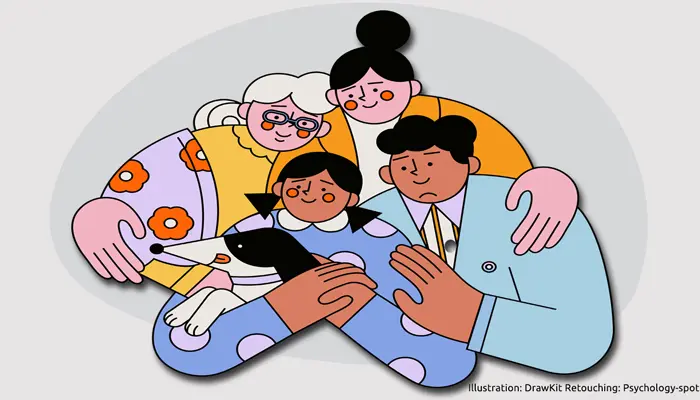
Parents educate and guide their children to the best of their ability. Sometimes when the situation overwhelms them or they feel disoriented, they turn to intuition or use “popular wisdom”, they apply what is supposed to be correct or what their own parents taught them when they were young.
However, some parenting tips can have a devastating effect on the child’s mind and, instead of unleashing its full potential, it ends up limiting it. In fact, the voice of parents can become an inner voice that accompanies us throughout life.
There is no doubt that the vast majority of parents want their children to be successful in life, so they try to transmit attitudes and ways of doing that help them achieve those goals. However, being successful is not a guarantee of happiness or emotional well-being. Therefore, many parenting tips that has been passed from one generation to another could become counterproductive and limiting beliefs.
Parenting tips that it would be better to reformulate
Tip 1. Think ahead. Focus on the prize.
What should we tell them? Focus on the here and now.
A mind that is constantly focused on the future – first to get good grades, then to enroll in a good university, and finally to get a suitable job – will be more prone to greater doses of stress and anxiety. Although there are different types of stress and a dose of eustress can act as a motivating agent, chronic stress maintained over time damages our health and cognitive functions, affecting our performance. Therefore, teaching children to focus on the future and what they can achieve is a condemnation to permanent stress.
In fact, focusing solely on the goal often means going through life with blinders on. Looking ahead prevents us from seeing the opportunities we have around us and, above all, reduces our ability to enjoy the here and now. Therefore, children could be much happier if we let them do what is spontaneous for them: focus on the present and make the most of it. The message to understand is that you don’t have to subordinate your current happiness to a future goal.
Tip 2. Stress is inevitable. Keep working.
What should we tell them? Learn to relax.
Anxiety disorders are being diagnosed at an earlier age because children feel enormous pressure to live up to the expectations of their parents and society in general. There is no doubt that life comes with a dose of tension and it is important that children develop an adequate tolerance to stress that allows them to deal with difficult situations, but the message we must send them is not that they push themselves to the limit but that they learn to relax before reaching that breaking point.
It is not beneficial to live in a state of constant overload, with full schedules that demand the consumption of excitants to be able to follow a superhuman rhythm while at night sedatives are used to be able to fall asleep. In fact, it is no accident that a study conducted at the University of Helsinki revealed that children whose parents suffer from burnout syndrome are also more likely to experience burnout at school. And it is that perfectionism and stress are also transmitted. Therefore, the best gift that parents can give their children is to teach them relaxation techniques for children that allow them to avoid all unnecessary stress.
Tip 3. Boost your strengths. Try not to be wrong.
What should we tell them? Make mistakes and learn to fail.
Parents, like most people, tend to put labels. Therefore, it is not surprising that they end up exaggerating certain abilities of their children while undermining others. If they notice that their child is particularly gifted at math or a sport, they will enhance that. At first glance, there is nothing wrong with it. However, this attitude promotes what is known as a “fixed mindset”, so that children will be less likely to explore and discover new things.
When a child receives praise for being athletic or good at math, he will be less likely to step out of that comfort zone and, for example, be encouraged to write a poem or participate in a play. These children are also more frustrated when something goes wrong and they are less likely to seek new challenges because they prefer to stick with the known, what they are “good at.”
That is why it is important that children learn to face new challenges, make mistakes, strive to develop new skills and, of course, fail. Psychologists from the University of Illinois found that children will show a more optimistic and even enthusiastic attitude towards challenges if they know that they only need effort to achieve it or try again. Plus, they’ll be less likely to feel bad about themselves when something doesn’t go according to plan.
Tip 4. Don’t be soft with yourself.
What should we tell them? Treat yourself with compassion.
Most people are their worst critics and judges. Although self-criticism is positive for growing and learning from our mistakes, when it is excessive it can become paralyzing, plunging us into a loop of dissatisfaction, reproaches and regrets in which we end up thinking that we are not good enough or that we are worth nothing.
Unfortunately, many parents believe that the best way to educate their children is to make them true Spartans. So they end up being overly critical and teach them to treat themselves harshly. However, excessive self-criticism can transmute into self-sabotage that undermines our self-confidence and generates a deep fear of failure.
Instead, a good advice from parents to children is to learn to treat each other with compassion, which does not mean feeling sorry for oneself or closing our eyes to the things we do wrong, but just treating ourselves as we would treat a friend in moments of failure or pain. It means being able to love ourselves even when we make mistakes, to find a warm place within us that serves as a refuge.
Tip 5. Don’t show your feelings. Crying is weak.
What should we tell them? Learn to manage your feelings.
Life is unfair. Most parents know this, and because of that strong sense of protection, they fear that others will harm their children. It is an understandable fear, but teaching them to hide their emotions will not protect them. Quite the contrary. Emotions such as sadness act as a social helper encouraging other people to reach out for help and support.
Asking children not to cry, not to be disappointed in the face of a gift they don’t like, or forcing them to greet a person with whom they feel uncomfortable with a kiss involves gradually disconnecting them from their emotions. This will not help them to manage them better, but will facilitate a process of emotional accumulation that will end up generating a deep dissatisfaction and will strain interpersonal relationships.
Instead, we must teach children that emotions are not their enemies and there is nothing wrong with feeling sad, disappointed, frustrated, or even angry. The most important thing is to find the cause of those emotions and learn to express them assertively. Thus, Emotional Intelligence can be developed in children and they will become more resilient adults in the face of life’s blows.
Sources:
Salmena-Aro, K. et. Al. (2011) Parents’ work burnout and adolescents’ school burnout: Are they shared? European Journal of Developmental Psychology; 8(2): 215-227.
Dweck, C. S., & Leggett, E. L. (1988) A social-cognitive approach to motivation and personality. Psychological Review; 95(2): 256–273.



